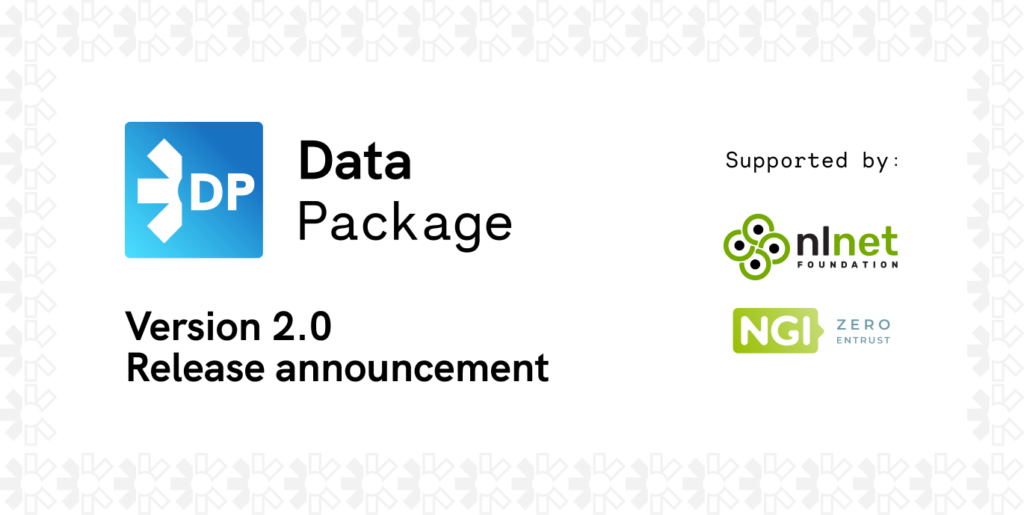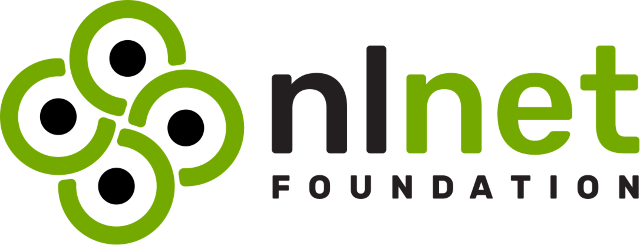
Text originally published at Frictionless Data blog
We are very excited to announce the release of version 2.0 of the Data Package standard(previously known as Frictionless Specs). Thanks to the generous support of NLnet, starting from November last year, we were able to focus on reviewing Data Package in order to include features that were often requested throughout the years and improve extensibility for domain-specific implementations.
Data Package is a standard for data containerisation, which consists of a set of simple yet extensible specifications to describe datasets, data files and tabular data. It is a data definition language (DDL) and data API that enhances data FAIRness (findability, accessibility, interoperability, and reusability). Since its initial release in 2007, the community has suggested many features that could improve or extend the standard for use cases that weren’t initially envisioned. Those were sometimes adopted, but there wasn’t a versioning or governance process in place to truly evolve the standard.
We started with the issues that had accumulated in the GitHub repository to build our Roadmap for v2. Many of the requested features are now adopted, making Data Package the answer for even more use cases.
In parallel we assembled an outstanding Data Package Working Group composed of experts from the community. We carefully selected a diverse group of people who brought different use-cases, formats, and data types that we would need the Standard to support. Together with them, we crafted a governance model that is explicit, in order to create an environment that adequately supports new contributions and ensures project sustainability.
We would like to thank each one of them for their remarkable contribution and for the incredibly insightful conversations we had during these months. Thank you to my colleague Evgeny Karev, Peter Desmet from the Research Institute for Nature and Forest (INBO), Phil Schumm from CTDS – University of Chicago, Kyle Husmann from the PennState University, Keith Hughitt from the National Institutes of Health, Jakob Voß from the Verbundzentrale des GBV (VZG), Ethan Welty from the World Glacier Monitoring Service, Paul Walsh from Link Digital, Pieter Huybrechts from the Research Institute for Nature and Forest (INBO), Martin Durant from Anaconda, inc., Adam Kariv from The Public Knowledge Workshop, Johan Richer from Multi, and Stephen Diggs from the University of California Digital Library.
If you are curious about the conversations we had during the Standard review, they are all captured (and recorded) in the blog summaries of the community calls. Alternatively you can also check out the closed issues on GitHub.
So what is new in version 2?
During these months we have been working on the core specifications that compose the Standard, namely: Data Package – a simple container format for describing a coherent collection of data in a single ‘package’, Data Resource to describe and package a single data resource, Table Dialect to describe how tabular data is stored in a file, and Table Schema to declare a schema for tabular data.
During the update process we tried to be as little disruptive as possible, avoiding breaking changes when possible.
We put a lot of effort into removing ambiguity, cutting or clarifying under-defined features, and promoting some well-oiled recipes into the Standard itself. An example of a recipe (or pattern, as they were called in v1) that has been promoted to the Standard is the Missing values per field. We also added a versioning mechanism, support for categorical data, and changes that make it easier to extend the Standard.
If you would like to know the details about what has changed, see the Changelog we published.
To increase and facilitate adoption, we published a metadata mapper written in Python. We have also worked on Data Package integrations for the most notable open data portals out there. Many people from the community use Zenodo, so we definitely wanted to target that. They have recently migrated their infrastructure to Invenio RDM and we proposed a Data Package serializer for better integration with the Standard (more info on this integration will be announced in an upcoming blog!). We also created a pull request that exposes datapackage.json as a metadata export target in the Open Science Framework system, and built an extension that adds a datapackage.json endpoint to every dataset in CKAN.
If you want to know more about how to coordinate a standard update, we shared our main takeaways at FOSDEM 2024. The presentation was recorded, and you can watch it here.
And what happens now?
While the work on Data Package 2.0 is done (for now!), we will keep working on the Data Package website and documentation together with the Working Group, to make it as clear and straightforward as possible for newcomers. In parallel, we will also start integrating the version 2 changes in the software implementations).
Would you like to contribute? We always welcome new people to the project! Go and have a look at our Contribution page to understand the general guideline. Please get in touch with us by joining our community chat on Slack (also accessible via Matrix), or feel free to jump in any of the discussions on GitHub.
Funding
This project was funded through NGI0 Entrust, a fund established by NLnet with financial support from the European Commission’s Next Generation Internet program. Learn more at the NLnet project page.










